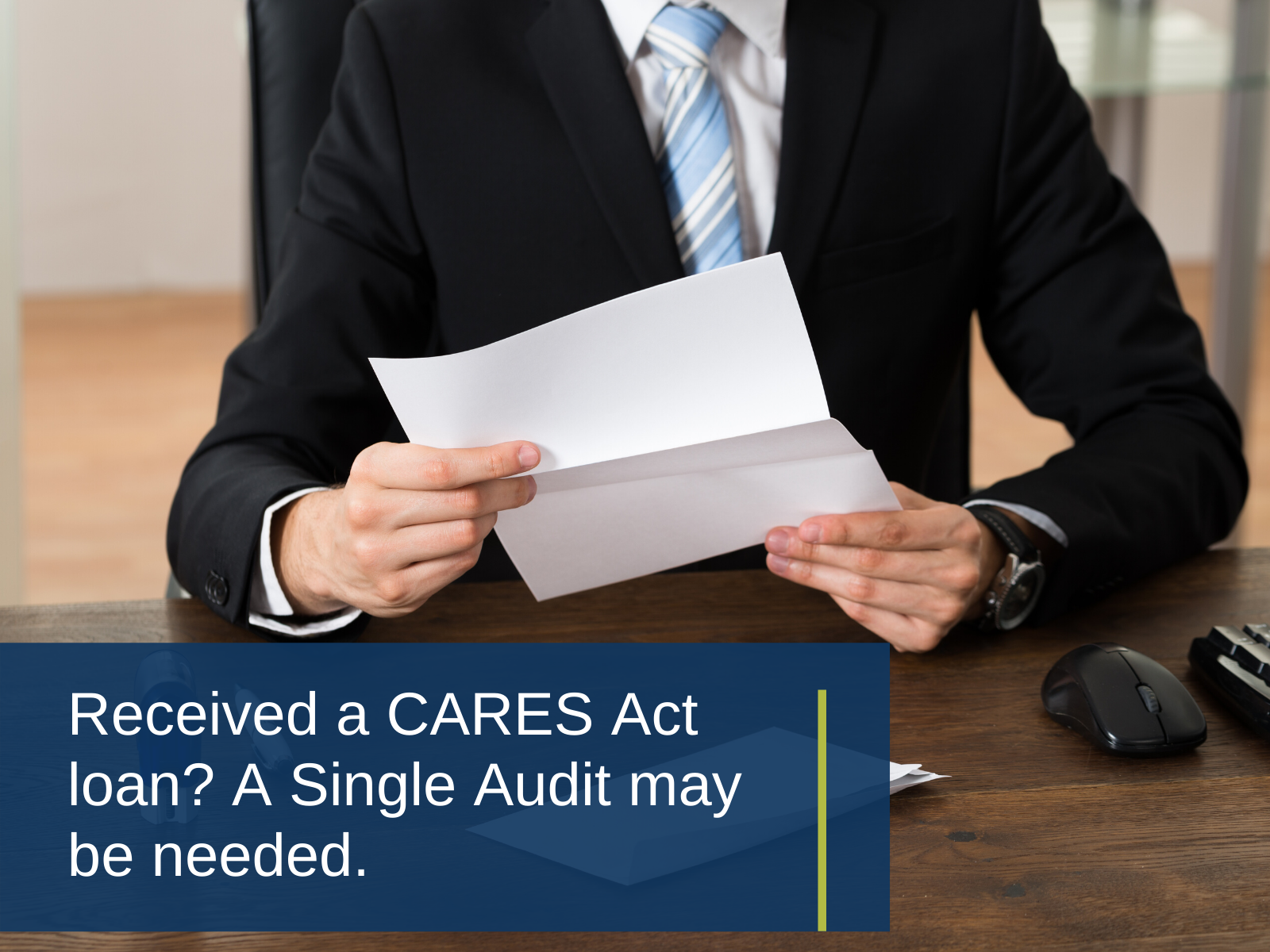Has your nonprofit organization received a loan from the new Payroll Protection Program (PPP) that was passed as part of the CARES Act?
Or perhaps an Economic Injury Disaster Loan (EIDL)?
If so, you may be required to have a special type of audit known as a “Single Audit.”
What is a Single Audit?
A Single Audit (formerly known as an A133) builds on a traditional nonprofit audit by testing and reporting on internal controls and compliance with federal programs (which includes grants/contracts and loan programs [forgivable and non-forgivable]) that a nonprofit receives either directly from the federal government or passed through state/local agencies.
Such federal funds are typically subject to a Single Audit when expenditures from these sources reach $750,000 in a given fiscal year.
In addition to the financial records you may be accustomed to providing, an auditor doing a Single Audit may need to pore through program files that you have never provided before, e.g., patient records.
The CARES Act and Single Audit Requirement
While regulations are changing quickly in the COVID-19 era, the latest word from the AICPA is that EIDL funds will be subject to Single Audit requirements, but PPP funds will not be.
For the 6/30/20 fiscal year, if your organization is undergoing a Single Audit for the first time, there may be little time to prepare.
What can you do to prepare for a Single Audit?
Start by creating a tally of all your federal funding, including EIDL funds, as well as your existing grants, contracts and loans from the federal government (including those passed through state and local agencies).
If your total federal expenditures for the fiscal year are below $750k (you may need to do some projections for the remaining portion of your fiscal year), you can breathe a sigh of relief for now.
If, however, you think you may meet the $750,000 threshold, you could take a couple of different paths:
- Contact your local congressional representatives and plead with them to pass legislation that exempts the new relief programs from the Single Audit requirement. If you go this route, please first have a look at my post on nonprofit lobbying.
- In the absence of clear authoritative guidance from the federal government, get yourself prepared for a Single Audit.
In the case of the second option, bear in mind the following tips…
Make sure that your books are tidy
It is highly advisable that you have cost centers (classes) set up in your accounting system so that you can track which funding sources are paying for your various expenses.
Avoid “double dipping”
One of the things your auditor will look for in a Single Audit is evidence of “double dipping,” i.e. charging the same expense to more than one funding source. If you are using PPP funds to cover your current payroll, you could run into compliance issues in your audit if you are also charging those same payroll dollars to a government cost reimbursement contract.
Avoid other compliance issues
You want to avoid compliance issues altogether, as they are a big deal in a Single Audit. In a normal audit, material weaknesses and significant deficiencies are reported in a letter to the board (or audit committee). This is not subject to public disclosure requirements. In a Single Audit, however, they become part of your audit report, which is transmitted to the federal government and posted on the internet.
Conduct a risk assessment of your internal controls for each of your federal programs
Make sure that you have designed and implemented procedures to prevent errors, fraud, and noncompliance. To aid in this process, you may want to refer to the Green Book, which is the federal government’s bible on internal control.
The 2020 OMB Compliance Supplement
Also, watch out for the release of the 2020 OMB Compliance Supplement, which is currently being revised to reflect COVID-19 updates by the Small Business Administration and other federal agencies. The supplement is heavily relied upon by auditors to identify and test compliance requirements.
Talk to your auditor ASAP and plan early
If you think you may need to undergo a Single Audit, talk to your auditor sooner rather than later.
Auditors who perform Single Audits must undergo unique and extensive continuing education requirements. Do not presume that your auditor is able and willing to perform a Single Audit.
Also, because auditor independence requirements are much stricter for Single Audits, your auditor’s ability to perform non-audit services (e.g. financial statement preparation) may be more complicated.
Early planning for a Single Audit is, therefore, critical.
Lastly, even if you are not required to undergo a Single Audit, you are still responsible for program compliance! It will likely be tested as part of your regular annual audit and/or by a government regulator.


